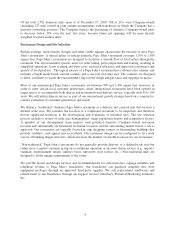Papa Johns 2009 Annual Report Download - page 21
Download and view the complete annual report
Please find page 21 of the 2009 Papa Johns annual report below. You can navigate through the pages in the report by either clicking on the pages listed below, or by using the keyword search tool below to find specific information within the annual report.14
our franchisees are, or may be, located. Experience has shown that a change in pricing or other marketing
or promotional strategies, including new product and concept developments, by one or more of our major
competitors can have an adverse impact on our sales and earnings and our system-wide restaurant
operations.
Our results of operations and the operating results of our franchisees may be adversely impacted by any
increases in the cost of food ingredients and other commodities.
An increase in the cost or sustained high levels of the cost of cheese or other commodities could
adversely affect the profitability of our system-wide restaurant operations. Cheese, historically
representing 35% to 40% of our food cost, and other commodities are subject to cost fluctuations due to
weather, availability, demand and other factors that are beyond our control. Additionally, sustained
increases in fuel and utility costs could adversely affect the profitability of our restaurant and QC Center
businesses. Our domestic franchisees buy substantially all of their food products from our QC Center
business. Changes in franchisee buying patterns for food products not required to be purchased from our
QC Center business could adversely impact the sales and profitability of that business.
Changes in consumer preferences or discretionary consumer spending or negative publicity could
adversely impact our results.
Changes in consumer taste (for example, changes in dietary preferences that could cause consumers to
avoid pizza in favor of foods that are perceived as more healthful), demographic trends, traffic patterns
and the type, number and location of competing restaurants could adversely affect our restaurant
business. Also, our success depends to a significant extent on numerous factors affecting discretionary
consumer spending, including economic conditions, disposable consumer income and consumer
confidence. Further adverse changes in these factors could reduce sales or impose practical limits on
pricing, either of which could materially adversely affect our results of operations. Like other food
industry competitors, we can also be materially adversely affected by negative publicity concerning food
quality, illness, injury, publication of government or industry findings concerning food products served
by us, or other health concerns or operating issues stemming from one restaurant or a limited number of
restaurants.
We are subject to federal and state laws governing our workforce. Changes in these laws, including
minimum wage increases, or additional laws could increase costs for our system-wide operations.
System-wide restaurant operations are subject to federal and state laws governing such matters as wage
benefits, working conditions, citizenship requirements and overtime. A significant number of hourly
personnel employed by our franchisees and us are paid at rates related to the federal and state minimum
wage requirements. Accordingly, further increases in the federal minimum wage or the enactment of
additional state or local minimum wage increases above federal wage rates will increase labor costs for
our system-wide operations. Additionally, proposed legislation that may make it easier for workers to
form unions or labor shortages in various markets could result in higher costs. Local government
agencies have also implemented ordinances that restrict the sale of certain food products. The recently
proposed national health care legislation could negatively impact our domestic system as our Company-
owned and franchised restaurants may have to provide health care coverage that was not previously
offered to certain team members. Additional government mandates, including proposed menu labeling
legislation, could increase costs and be harmful to system-wide restaurant sales.
























